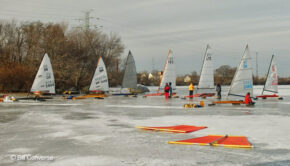Be a Good Sport
Published on September 1st, 2015
by David Dellenbaugh
When it comes to the subject of sportsmanship, I have two favorite quotes that I recommend to anyone looking for guidance. The first is from one of Stuart Walker’s many books. He wrote: “Winning is the object of the game, but it is not the object of playing the game.” The second quote is from Paul Elvstrom, the Great Dane, who once said, “You haven’t won the race if in winning the race you have lost the respect of your competitors.”
It’s amazing how often these statements ring true for me. In fact, whenever I start to get too obsessed with winning, I take a deep breath and try to remember them. I also think about sportsmanlike role models and examples of fair play.
When I was a member of US Sailing’s Sportsmanship Committee, it was refreshing to read dozens of letters each year about people who were nominated for sailing’s national sportsmanship award. A few years ago the trophy went to Scott Steele, one of America’s top boardsailors. At the Goodwill Games, Scott had helped his closest competitor, Grzegorz Myszkowski of Poland, get reinstated after being incorrectly scored OCS. As a result, Myszkowski won the gold medal and Steele got the silver.
“The number one rule in my book is honor,” said Steele. “What’s most important to me in sailboat racing is that the competition is fair – that everyone is given an equal chance to win. I hope everyone sails with this feeling.” Steele is one of the vast majority of racing sailors who, like Elvstrom, do not believe in “winning at any cost.” They try their hardest to win each race because that’s the goal (as Walker points out), but they participate in the sport for many additional reasons besides coming in first.
To me, sportsmanship includes fairness, courtesy, friendliness and many more qualities that are just as important on shore as on the water. The bottom line on good sportsmanship in sailing, as in most other parts of life, is the Golden Rule. In other words, “Do unto others as you would have others do unto you.” If you always treat your teammates, your competitors and everyone else involved with the sport as you would like to be treated yourself, then you won’t have to worry about sportsmanship. Here are some practical ideas on how you and your friends can be good sports and encourage a more positive atmosphere in your fleet and club.
Compliment your competitors when they make a good move or sail a good race. Nothing feels better than acknowledgement and appreciation from your fellow competitors. Don’t just say “Good going” to the first couple of boats, because they’ll hear that a lot. You’ll make a much bigger impact if you notice what someone in the middle or back of the fleet did well, and appreciate that. “Hey Joan,” you might say, “you played the shifts almost perfectly on that first beat.” I know I’d feel pretty good if someone said that to me.
Abide by and enforce the rules. It’s clear that winning is a major objective of sailboat racing. Unfortunately, some sailors are tempted to overstep the boundaries of the rules to attain this end. That’s why it’s important to commit ourselves to sailing within the rules. When you play fair and square, you will win just as many races, and I guarantee the respect you get from your competitors will be much greater.
Another part of being a good sport is taking responsibility for enforcing the rules. We all want to be nice guys who don’t make waves. But our sport is a self-policing one. If we don’t enforce the rules out there, no one will. I’m not suggesting you become a sea lawyer – but encouraging rule compliance will make the game better for everyone.
Offer a prize for sportsmanship at your regattas. If possible, have the competitors vote for the winner of this prize, and give this award as much importance as you do the first-place trophy. Of course, we don’t want people acting sportsmanlike simply to win a prize (it would be nicer if the motivation was internal, not external). But in the short run a sportsmanship prize will get everyone thinking about the subject.
While we’re on this subject, don’t forget crew prizes, and consider alternative prizes such as “Most improved” and “Top family team.”
Say thanks to the race committee and regatta organizers. This may seem like a very obvious thing to do, but if we took a survey of all the race officers around the world, I bet a majority would say they don’t get much appreciation from the sailors. Volunteer race committees, regatta organizers, and juries are the backbone of racing, and it’s almost impossible to give these hard-working people too much credit. I recommend something more than a token thanks at the awards ceremony. Talk to them personally during the regatta and offer words of support and appreciation. You may not agree with every action of a race committee or every decision of the jury, but you can always thank the members for volunteering their time and working hard.
Another good idea is writing a letter of thanks to the membership of the club where you’ve just sailed a regatta. Thank them for a good time and for all the sacrifices they made to help insure that your regatta was a success. Send your letter to the regatta chairperson (with a note of thanks to him or her as well), and say you wouldn’t mind if your letter was posted on their bulletin board or reprinted in their newsletter.
Nominate someone from your club or fleet for US SAILING’s Sportsmanship Trophy. If you don’t already have one, create a local prize that is given annually to a club or fleet member who has displayed high standards of sportsmanship during the previous year. Then make the winner of your trophy an automatic nomination for US SAILING’s award. This is a great added incentive for recognizing good sportsmen and women in your local area.
Share your knowledge by being a teacher. Learning and improving are a large part of what our sport is all about, and these happen much more quickly when we work together. If you can help someone understand how to sail his or her boat even a little better, then you’ll both “win.” You don’t have to be a “rock star” in order to help other people become better sailors. No matter what your skill level, there are always some sailors who can learn from you. In fact, you may do a better job if you’re not the class champion, because you’ll be more accessible and less intimidating.
Give other boats the benefit of the doubt. One of the best things you can do while racing is to treat your competitors as you would like to have them treat you. For example, let’s say you’re approaching the jibe mark and a boat that’s overtaking you from behind is pressing for an inside overlap. You may not even be sure yourself if they have gotten an overlap or not. So instead of automatically yelling “No room,” give the other boat a break by saying “Go ahead.” This may cost you a boat or two in the short run, but remember, in the long run you will “reap what you sow.”
Give praise to the other people in your boat. It’s not uncommon for skippers to be critical of their crew while racing. Unfortunately, negative motivation is not nearly as good as positive reinforcement. So think positively. If you’re a skipper, look for ways to compliment your crew: “Hey, that was a great roll tack.” “Nice job on the pole.” “Good call on the layline.” If you’re a crew, try to find ways to appreciate your skipper like: “Great start” “Good job steering the waves.” “Way to get inside at the mark.” This type of encouragement will help everyone feel more confident and better about themselves. It also makes it easier to handle a little constructive criticism once in a while. This will improve not only your performance on the race course, but your relationship after the race as well.
Be a good role model. The primary way for junior sailors and new sailors to learn about what’s sportsmanlike in sailboat racing is from people like you. You can make a difference, so set a good example
Sailing is a great sport because it puts the question of sportsmanship squarely in our own hands. In most cases, we don’t have referees who force us to follow the rules and penalize or fine us when we don’t. That’s why we must continue doing things like those mentioned above. If you treat other people with respect on the race course, they’ll treat you with respect, too. That not only increases your chances of getting a few breaks in the race, but it will make you more successful in the rest of your life too.
Background: David Dellenbaugh is the publisher, editor and author of Speed & Smarts racing newsletter. He was the tactician and starting helmsman on America3 during her successful defense of the America’s Cup in 1992 and sailed in three other America’s Cup campaigns from 1986 to 2007. David is also a Lightning world champion, two-time Congressional Cup winner, seven-time Thistle national champion, two-time winner of the Canada’s Cup, two-time Prince of Wales U.S. match racing champion and past winner of the U.S. team racing championships for the Hinman Trophy.









 We’ll keep your information safe.
We’ll keep your information safe.